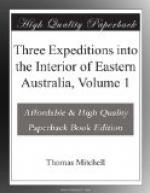We reached the second channel at a higher part than that attained by me previously, so that the distance traversed by the party was only seventeen and a half miles, as determined by the latitude; and this journey, although very distressing to the cattle, was accomplished by half-past two. Thermometer 96 degrees. Here the ponds opened into a large lagoon covered with ducks. It was surrounded with the remains of numerous fires of natives, beside which lay heaps of mussel shells (unio) mixed with bones of the pelican and kangaroo. Latitude 29 degrees 43 minutes 3 seconds South.
January 17.
Leaving our encampment at six A.M. we first crossed a small plain, then some forest land, and beyond that entered on an open plain still more extensive, but bounded by a scrub, at which we arrived after travelling seven miles. The soil of this last plain was very fine, trees grew upon it in beautiful groups—the Acacia pendula again appearing. The grass, of a delicate green colour, resembled a field of young wheat. The scrub beyond was close and consisted of a variety of dark-leaved shrubs, among which the eucalypti were almost the only trees to which I was not a stranger. Here I halted the carts while I penetrated three miles into this scrub, accompanied by Mr. White, in hopes of finding either the Namoi or the Gwydir—but without success. Continuing the journey in the direction of 37 degrees West of North we entered an open alley which had the appearance of being sometimes the bed of a watercourse. It terminated however in higher ground where bulrushes grew, and which seemed very strange, because we then approached a much more open and elevated country. Most of the ground was covered with hibiscus* (with red stalk and small flower) which grew to the height of twenty inches and alternated with patches of luxuriant grass, Acacia pendula, and eucalyptus. At eleven miles we encountered a channel in which were many ponds, its direction being, like that of the others we had crossed, to the southward of west. Here we encamped, the bullocks having been much fatigued, and also cut in the necks by the yokes. The bed of these ponds was soft, and it required some search before a good place could be found for the passage of our carts: when this was accomplished, and the camp selected, I rode forward in a north-west direction, anxious to know more of the country before us.
(Footnote. Hibiscus (Trionum) tridactylites, Lindley manuscripts; annuus, pilosus, foliis radicalibus subrotundis integerrimis caulinis digitatis; laciniis pinnatifidis lobis distantibus cuneatis apice dentatis, calyce piloso.)
LAUGHABLE INTERVIEW OF DAWKINS WITH A TRIBE.




